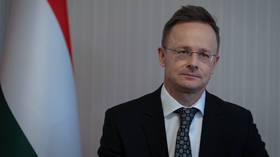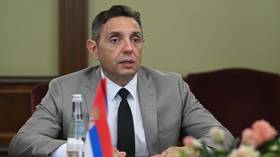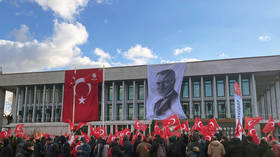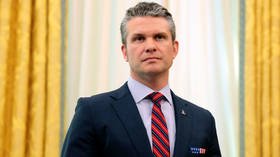ISIS & Islamist groups in Germany recruit refugees, infiltrate mosques – intel chief
Germany’s domestic intelligence agency said it has recorded at least 340 attempts by Islamic State and other Islamist groups to recruit potential fighters in refugee centers and local mosques that remain largely outside the government’s oversight.
“To date, there are more than 340 cases which are known to us,” Hans-Georg Maassen, head of Germany’s Federal Office for the Protection of the Constitution (BfV), said, as cited by Die Welt.
“But these are only the cases which we know. Probably, there could be more.”
#ISIS sleepers infiltrated #Germany, ready to take action - top intel official https://t.co/yo1SkhZgoSpic.twitter.com/1YtMzYgwzz
— RT (@RT_com) 12 августа 2016 г.
Previous media reports indicated that Islamic State (IS, formerly ISIS/ISIL) agents have been trying either to infiltrate Europe inside refugee flows or approach asylum seekers already in Germany to recruit them.
Maassen added that refugee centers and hostels are the likeliest target of IS recruiters. “We are concerned that Salafists and other Islamists do recruit in asylum seeker camps,” he said.
“As we know, there are many young people among asylum seekers who belong to Sunni Islam. They come from a conservative Islamic environment and attend Arabic-speaking mosques every Friday.” He also said numerous Islamist and Salafist mosques operate in Germany.
The BfV is concerned about the radicalization of young Muslims, Maassen added. “They pave the way for radicalization. This is dangerous and that is why we put many of them under [intelligence] watch.”
The official also said the Islamic community in Germany is heterogeneous and exempt from government oversight. “In Germany, the Arabic-speaking mosque landscape is not organized. From the state’s perspective, there are relatively few opportunities to influence [them].”
Germany, which until quite recently had seen no large-scale terrorist attacks, was shocked by four assaults in quick succession, conducted by young people of Muslim descent with radical Islamist sympathies.
“Therefore, the lesson is – we must not concentrate on IS only, which apparently sends terrorist commandos to Europe,” Maassen said.
“There could be lone wolf attackers who are radicalizing on their own.”
But tracking potential terrorist suspects and their communications is no easy task, the domestic intelligence chief admitted. “A fundamental problem is that we don’t know who chats with who,” he said, citing multiple “legal obstacles” to the monitoring of telephone conversations and emails.
Encryption, which has become increasingly popular with online messengers such as WhatsApp, is also part of the problem, Maassen said.
“Here we need a society which watches for something unusual in a person – for instance, when someone has a smartphone with an IS flag installed as a screensaver.”














